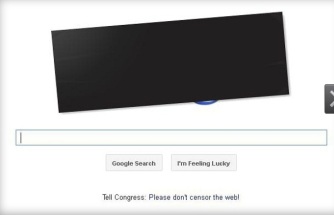His Master had told him to call for help should a Wolf attack the flock, and the Villagers would drive it away. So now, though he had not seen anything that even looked like a Wolf, he ran toward the village shouting at the top of his voice, “Wolf! Wolf!”
As he expected, the Villagers who heard the cry dropped their work and ran in great excitement to the pasture. But when they got there they found the Boy doubled up with laughter at the trick he had played on them.
The Boy Who Cried Wolf, Aesop’s Fables No. 210

Quick–how many times have you heard Google try to beat back challenges to their bad behavior with the old “Don’t Break the Internet” meme? We’ve seen it many times, of course, but repetition doesn’t make it right and it definitely doesn’t make it true.

The EU Copyright Directive is a “Looming Catastrophe”
If there’s legislation, a lawsuit or some policy action that Google finds a commercial threat to their vast riches, especially including ill-gotten gains, it’s only a matter of time until they summon the academic and NGO chorus of Cassandras to bemoan, wail and rend garments over the single most important existential threat to humanity since the plagues of Egypt–breaking the Internet.

Breaking the Internet takes a few different forms including crushing innovation (or in the Googleplex, stealing everything that they can get away with). And yet after a decade or more of this bunk, the Internet still trundles on, some how squeaking to get by despite Google’s breathless warnings. Not to mention the multi, multi million dollar megaphone they use to broadcast their message far and wide from the halls of Congress to the children of Members of the European Parliament.
Google’s at it again, this time as part of the litigation involving its theft of copyrights from Oracle. The problem for Google is that they can’t just run roughshod over Oracle the way they can practically everyone else, including governments. We should be paying attention because for once Google may actually get punished in a way that hurts unlike the multi-billion fines in Europe that they absorb as a cost of doing business.
Here’s the story this time. Google was getting their lunch eaten by Apple’s iPhone and needed to get Android up and running fast. Google wanted to license a bunch of Java applications that were owned by Oracle. You may say, what about Sun Microsystems which created Java? Correct, but Oracle bought Sun so that’s how Oracle got involved. And extra points if you remember who used to work at Sun Microsystems? That’s right–UNCLE SUGAR! Eric Schmidt his bad self. Strange coincidence, yes? The same Uncle Sugar who mysteriously resigned as Google’s executive chairman. Uncle Sugar says, “Me, too!” Boy we miss you Unk.

The masked man says “Me, too!”
But I digress. So Google supposedly creates some of its own Java-related software. Let’s get this straight–Google could have developed their own platform with identical functions to Oracle’s Java as did Apple and Microsoft. But–and this is really what I think the case is all about–Google made verbatim copies of several Java APIs that they couldn’t reverse engineer…sorry, I mean work around. This all to avoid getting a license. And you know how they argue that they got around those verbatim copies?

You guessed it–fair use. Laughable, but no more laughable that Google’s whack a mole DMCA fake license practices they are fighting us on with their opposition to the CASE Act based on..you guessed it, fair use. Breaking the Internet, etc. It’s funny until you realize they are not kidding.

Google lost twice against Oracle in the case, but appealed its most recent failure to the Supreme Court of the United States, or “SCOTUS” as it’s known. So Google’s big strong line in their papers is this:
Given the ubiquity of smartphones today, it is easy to forget the challenges that developers initially faced in building the operating systems that allow modern smartphones to perform their myriad functions. Among other things, developers had to account for smaller processors, limited memory and battery life, and the need to support mobile communications and interactive applications….[If Google loses the case, the ruling] will upend the longstanding expectation of software developers that they are free to use existing software interfaces to build new computer programs. Developers who have invested in learning free and open programming languages such as Java will be unable to use those skills to create programs for new platforms—a result that will undermine both competition and innovation.
Yep…law and order every time, marshal. Google wants to wrap itself in the flag of those plucky “developers” who are just incapable of speaking for themselves so Google must do it for them as well as truth, justice and the American Way. This is about as believable as Google positioning themselves to be on the side of artists because they paid some YouTubers to make propaganda against the European Copyright Directive.

Will innovation survive? Will the Internet be broken? Or did the boy cry wolf one too many times? Will justice be done for once and done to Google?
Stay tuned. There may be another Wreck-It Ralph sequel in the works .
[from https://ift.tt/2llz3cO]

No comments:
Post a Comment